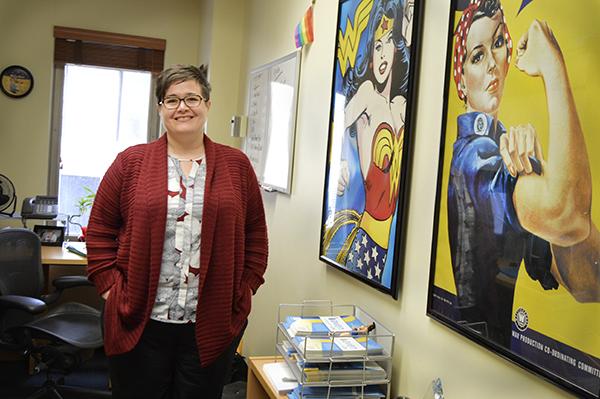Updated: Jan. 19, 2016 at 10:29 a.m.
Students arriving at GW in the fall may be able to complete sexual assault prevention trainings with their teams or student organizations as officials try to make the program more effective.
Carrie Ross, the assistant director for sexual assault prevention and response, said she plans to tailor this year’s in-person sexual assault prevention trainings based on students’ backgrounds and interests. The newly structured sessions would make students feel more comfortable discussing heavy topics and asking questions, based on last year’s exit survey feedback.
“Next year I want to be a little less generic,” Ross said, adding that her intention is to “provide some opportunities for people who are already in affinity groups.”
Officials required mandatory training sessions on sexual assault prevention during Welcome Week for new students for the first time this fall. Student leaders lobbied for the in-person sessions after University officials said they would only require students to complete online modules about sexual assault. University President Steven Knapp officially supported these trainings in a meeting with students in April.
The Office of Title IX reported 97 percent of freshmen completed those trainings, as well as the online module over the summer.
Ross said she has considered dividing up training sessions by groups that live together, groups involved in activities together and other groups made up of students who might have been exposed to sexual violence in the past, but the decisions are not official.
“Students for whom, in terms of awareness or experience, come to it with a little more knowledge,” Ross added. “We can create a space where they can learn what that means here at GW or how they can get involved here.”
Ross said where students come from and who they are involved with determines their experiences with and exposure to sexual violence. For example, athletes or international students may go through their own trainings because each of those groups come from different backgrounds and might have different experiences on campus.
But Ross added that she thought students took a great deal away from the in-person sessions last year.
“I was pleasantly surprised about how engaged people were and how much ownership people took,” Ross said. “I was really pleased to see there was a really good match between what they said they remembered and what we hoped they would walk away with.”
GW has created custom sexual assault prevention and bystander intervention trainings for groups like athletes before, and specific populations like Greek life students have also hosted their own trainings.
Ross added that she is interested in balancing the topics covered in the online module that students completed versus in-person trainings, based on student survey results. While the trainings will include the same online module for at least another year, Ross said she and her team are working on making the two more complementary. For example, if one course covers one topic more thoroughly, it may not be as widely touched upon in the other version.
Michaela Stanch, one of Students Against Sexual Assault’s peer educators, said she had heard from students that last year’s in-person and online trainings covered the same topics, but that the in-person sessions were more engaging than online sessions.
“The groups are very big, so especially for shyer students, it’s hard to ask the simpler questions. We do see that groups feel a lot more comfortable when they are with their own group,” Stanch said.
She added that students could be more interested in a topic when they are in sessions with their friends and direct peers.
“When you throw a bunch of students together just because they are all free at 1 p.m. on a Wednesday, it’s different than if you are with all of your brothers or sisters in your fraternity or sorority or you’re with people of the same religious denomination as you,” Stanch said.
Sarah Edwards, the director of a master’s in health, rehabilitation and addictions counseling at the University of North Dakota, said she has found the main issue with sexual assault prevention training is “overcoming the motivational barrier.”
Edwards added that the more tailored sexual assault prevention becomes to a certain group, the more relevant students will feel the topic is to them.
“The more likely they will pay attention, that they will want to remember the information, that they are actually motivated to be there,” she said.
Ellie Smith contributed reporting.







